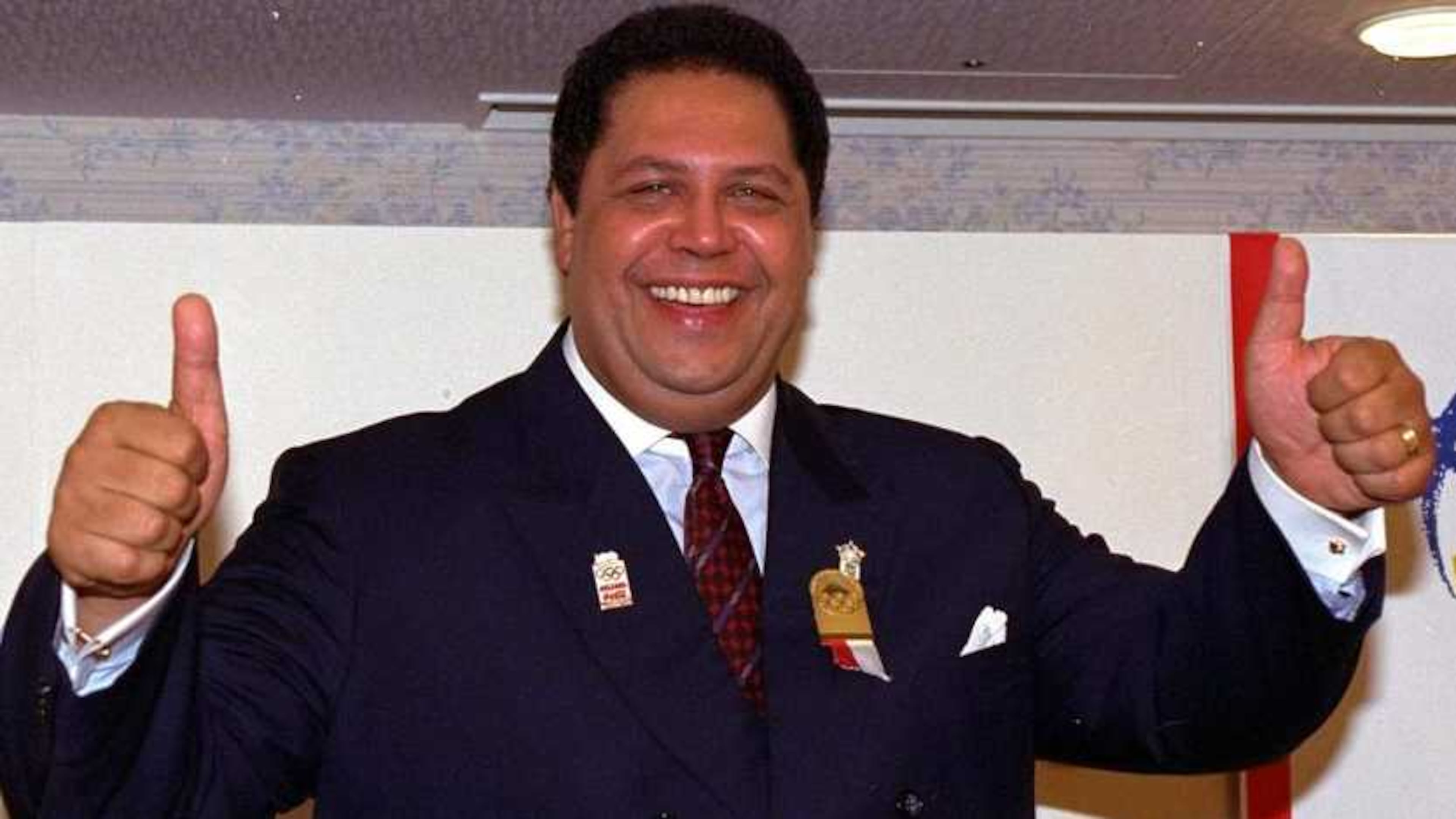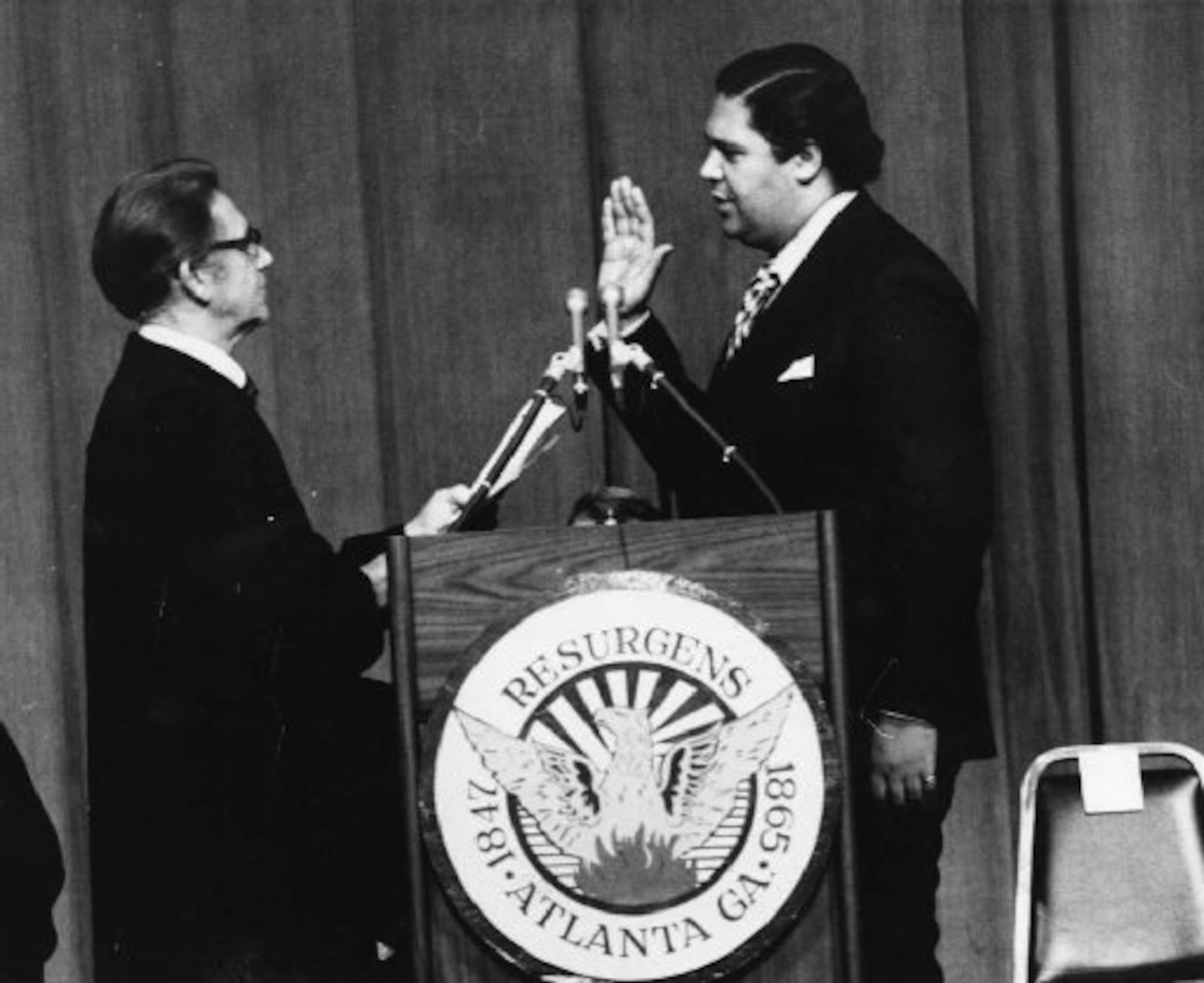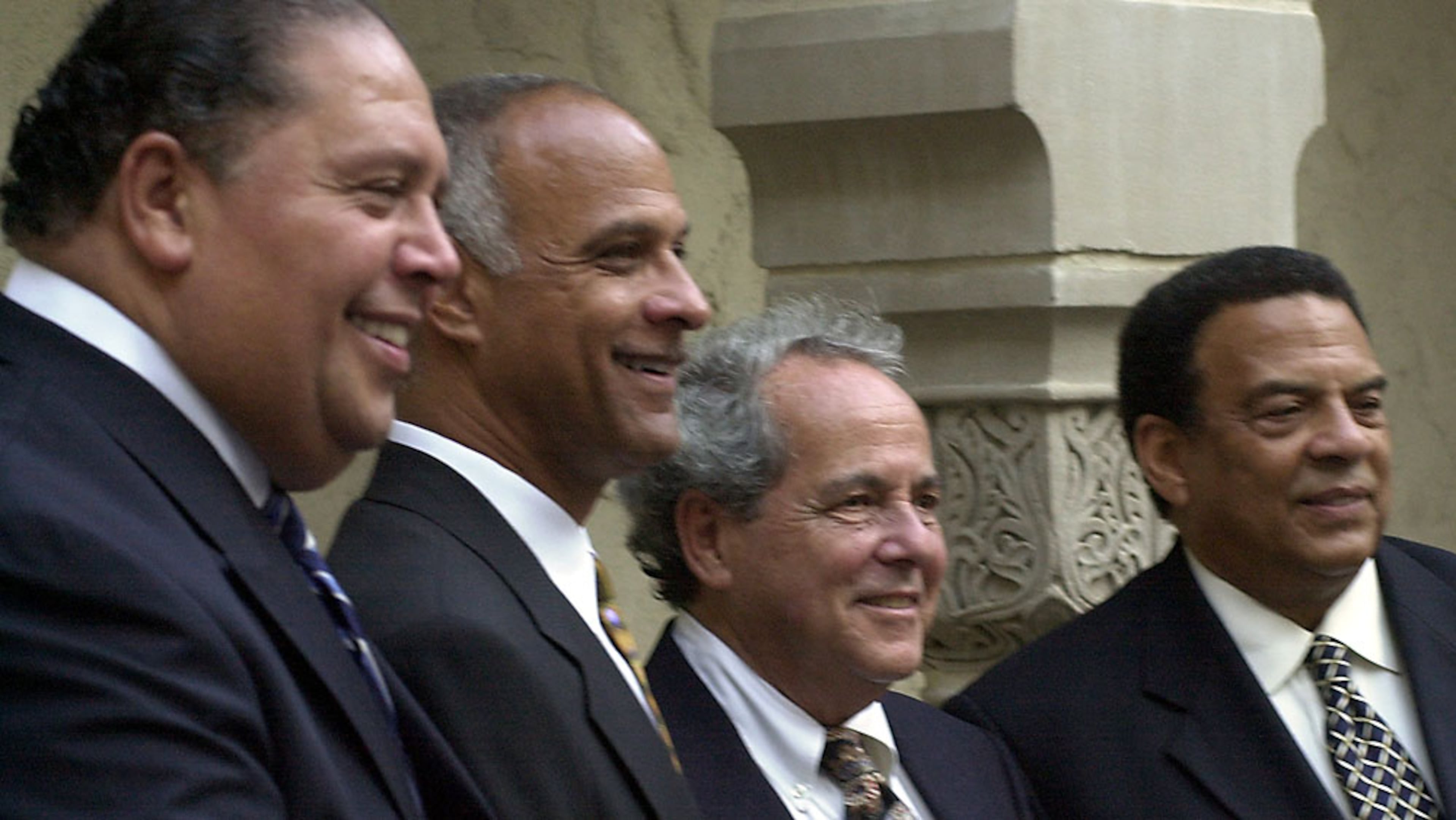From 2003: Maynard Jackson, 1938-2003: ‘A lion of a man’

(This obituary was published June 24, 2003 by AJC reporter Ernie Suggs. Jackson was mayor of Atlanta during the Atlanta child murders.)
Maynard H. Jackson Jr., elected in 1973 as the first African-American to run a major Southern city, helped create an Atlanta that boasted the world's busiest airport, allowed minorities to do business with the government, hosted the Olympic Games and attracted people to a black mecca.
Mayor Shirley Franklin, a Jackson protegee, on Monday remembered Jackson, who mentored her during her early years in politics. "He was a lion of a man, who lived with courage, ushered in a new generation of leaders and never wavered from his love and commitment to the people of Atlanta, " Franklin said.
Standing close to 6-foot-4, Jackson could be a physically imposing and intellectually intimidating figure, although he was remembered most often as gentle. "It seemed like he was talking down to you, but, really, nobody was more genuine or sincere or loved people more than Maynard Jackson, " said Andrew Young, a former Atlanta mayor, U.S. congressman and U.N. ambassador.

The great-grandson of slaves, Jackson was only 35 when he was first elected mayor. During his first, eight-year stint in City Hall, he launched programs intended to empower neighborhoods, raised the profile of black pride, included minorities in the city's economic boom and began building the foundation that one day would land the Summer Olympics.
Perhaps fittingly, the last place Jackson set foot in Atlanta was Hartsfield International Airport. It was Jackson who pushed through efforts to build and expand Hartsfield in the late 1970s. His tenacious campaign to gain airport contracts for minorities at times pitted Jackson, a political novice, against Atlanta's powerful business community.
Young credits Jackson with clearing the way for him to succeed as mayor. "He really did a lot of the hard work for me so I just had to build on that foundation, " said Young, who was sworn in as mayor in 1981 shortly after the airport expanded. "And it's always bothered me that there's nothing --- there are streets and a Georgia State school named after me --- and nothing named after him."
Billy Payne, who worked with Jackson in the city's successful bid for the 1996 Olympics, sparred sometimes bitterly with Jackson over who would control the multimillion-dollar preparations for the Games. Even so, Payne on Monday credited Jackson with changing the way the world looked at Atlanta.
Payne, who headed the Olympic organizing committee, recalled traveling with Jackson to Cuba for an Olympics meeting before Atlanta was chosen. "I remember Maynard saying, 'We are not just going to go to the Olympic guy. We are going to meet with the president, Fidel Castro, ' " Payne said. "He was always thinking about the big picture."
Mayor Maynard Jackson: A 50-year legacy
To celebrate the 50th anniversary of Jackson’s first mayoral victory, The Atlanta Journal-Constitution is publishing stories about the various aspects of Jackson’s legacy and influence – on Atlanta, on Georgia, and beyond:
The man who became the South’s first Black mayor
Maynard Jackson lifted up Black businesses, but some say city faltered
Maynard Jackson left lasting imprint on Atlanta airport
Atlanta’s Black culture took off with Maynard Jackson administration
>> RELATED: Maynard Jackson gets monument befitting his legacy
News of Jackson's death spread quickly and far, from former presidents to people who had simple brushes with him.
"Mayor Jackson has been a great friend and supporter throughout his successful political career, " said Jimmy Carter, who was governor and later president during Jackson's first stint as mayor.
Sam Massell, Atlanta's most recent white mayor, was defeated by Jackson in the historic 1973 election. Massell said he watched as blacks expressed their growing political power through Jackson.
Many white Atlantans will remember Jackson as the face of black power, Massell said. "He was a thorn in their side on many occasions, but I think most respected the role he pursued and the strength he demonstrated with his success, " he said.
Massell described Jackson as a kingmaker who could influence local elections across the country simply by showing up and favoring a candidate. Here in Atlanta, all the mayoral candidates that Jackson endorsed have won. And since he won in 1973, Atlanta hasn't had a serious white mayoral candidate.

"Maynard was one of those extraordinary leaders who built great bridges spanning racial, economic and class lines and who brought a real vision and reason to the city of Atlanta and its people, whom he dearly loved, " said Coretta Scott King, widow of the Rev. Martin Luther King Jr.
One of them is Atlanta resident Peggy Davis. Through tears Monday, she said Jackson represented a "sophisticated, compassionate and progressive Atlanta."
Affirmative action:
Along with the airport and the Olympics, perhaps Jackson's most enduring legacy is his fight to institute an affirmative action program that elevated the percentage of city contracts awarded to minorities from less than 1 percent in 1973 to 38.6 percent five years later. He applied his program of "joint venture, " which brought together white-owned and minority-owned firms, most prominently at the airport.
"We built the Atlanta airport, biggest terminal building complex in the world, ahead of schedule and within budget --- and simultaneously rewrote the books on affirmative action, " he would say years later. Under his watch, joint venture produced about 25 new black millionaires, Jackson boasted.
"He was just a dynamo, a human dynamo, " said Julian Bond, longtime friend and chairman of the NAACP. "Jackson was always someone who always kept the race first, who always was interested in ensuring that African-Americans got their fair share."

The Rev. Joseph Lowery, another civil right leader, said: "He gave the strongest support for diversity of a city's business than any other mayor in this country."
U.S. Rep. John Lewis, who called Jackson a "founding father of the New Atlanta, " said that in his travels as a congressman, many people marveled at Jackson's efforts to funnel more city business to minority contractors. In fact, Jackson's affirmative action plan has been replicated in other municipalities.
"He was always out there daring and sailing against the current, " said Lewis. "He became the model, the yardstick of how people measure the contributions and production of elected officials. It is a living testimony of what a person could do."
Critics of the program, however, said that in later years many contracts and bids awarded at the airport went to "Friends of Jackson."
During his third term as mayor, Jackson chose as Hartsfield manager Ira Jackson — no relation to the mayor — a former city councilman whose airport experience was limited to having been chairman of the council's Transportation Committee. In 1994, Ira Jackson and former Councilman Buddy Fowlkes were convicted of receiving more than $1 million in bribes in a concessions scandal. Three businessmen with airport contracts, Harold Echols, Bill Brooks and Dan Paradies, also were convicted.
Although he was never accused of wrongdoing, Jackson was criticized for benefiting from the program he started by landing airport business as a "disadvantaged" minority subcontractor after leaving office.
His legacy: Ambassador for Atlanta

A son of prominent blacks, Jackson never seemed to fit the disadvantaged label. He graduated from Morehouse College at the age of 18 and was elected mayor of the South's predominant city at 35. That same year, Los Angeles' Tom Bradley and Detroit's Coleman Young became the first black mayors of their cities. The historic elections came five years after Cleveland's Carl Stokes and Richard Hatcher of Gary, Ind., had broken the color line for big-city mayors.
Moved to take up politics after the 1968 assassination of King, Jackson challenged legendary Sen. Herman Talmadge in the Democratic primary race for U.S. Senate.
Jackson said later that he had little hope of winning but thought Talmadge, a segregationist, ought not to run unopposed. Jackson ran a grass-roots campaign, attracting support from poor white farmers, and won more than 200,000 votes, carrying the city of Atlanta.
Five years later, he challenged Massell and took the mayor's job.
"For him to be elected mayor for the city of Atlanta, in the heart of the South, that created a sense of hope and optimism, ' Lewis said. "Maynard emerged as a very powerful symbol and ambassador for Atlanta."
In a South still reeling from Jim Crow, Jackson helped create a new image.
Beaming on the cover of Ebony magazine or Jet, Jackson offered hope that Atlanta was a place in the South where blacks could migrate back to and prosper.
Gary M. Pomerantz, author of "Where Peachtree Meets Sweet Auburn, " which chronicled Jackson's family, said Jackson "was raised to lead."
"In fact, he was raised for that moment specifically in October of 1973 when he was elected the big city South's first African-American mayor, " said Pomerantz, a former reporter for The Atlanta Journal-Constitution. "He understood the tide of history was sweeping across Atlanta and the entire South."
While he continued to push for change, the years of 1979-81 during Jackson's second term also were painful. Twenty-nine young black boys and men were killed as part of the notorious "Atlanta Child Murders." Wayne Williams eventually was convicted of two of the killings after an intense manhunt and investigation.

Greg Pridgeon, a former Jackson aide who is now Mayor Franklin's chief of staff, said the period was very difficult for Jackson. "It was something that created turmoil inside of him, " Pridgeon said. "He wanted to get it resolved and catch the perpetrator.
"He put extra pressure on the police and on himself to make this bad situation go away. It was a difficult time in his administration and his life --- young black kids getting snatched up and killed. Him seeing young Atlantans, whom he loved dearly, killed, hurt him."
An eloquent orator, Jackson had a political career that spanned a quarter-century. Among Atlanta mayors, only William Hartsfield, who served 23 years, had a tenure at City Hall that exceeded Jackson's dozen years.
Though proud of his achievements, Jackson in later years wondered about his own legacy: "I can see that my full name will be Maynard Jackson First Black Mayor of Atlanta, Georgia."
>> RELATED: On the set of “Maynard,” a film about Atlanta’s first black mayor
Jackson thought the label unfair, because it cheated him of his other accomplishments, not only building the airport and pushing affirmative action but also giving voice to intown neighborhoods, establishing a cultural affairs department and serving as the first manager under the city's new charter.
He was proud of the obscure fact that he was a member of the Screen Actors Guild, for his role as a preacher in the 1977 movie "Greased Lightning" with Richard Pryor and Julian Bond.
"The Atlanta that we know today, a place that is called the 'Capital of the New South, ' is due to Maynard's work, " said Bill Campbell, who succeeded Jackson as mayor in 1994. After undergoing heart bypass surgery in 1992, Jackson decided in 1993 not to seek a fourth term. He recruited Campbell, his City Council floor leader, to succeed him. "He came and asked me to run for mayor and supported me in 1993 and 1997, " Campbell said. "Nobody contemplated that he would not be mayor during the Olympics. We assumed that he would be there for the full eight years. I was surprised and very gratified that he saw in me the kind of leadership that would carry his legacy on."

During a hard-fought 1997 election, Campbell was pitted against Marvin Arrington in a tight campaign that turned, in part, on skin color. During a radio debate, Arrington, who had served with Jackson in city government for 20 years, said, "During the height of the civil rights movement . . . [Jackson] was in Cleveland, passing."
Arrington later said he did not intend to imply that Jackson, who was light-skinned, was "passing" for white. Rather, he meant Jackson was "passing out dictionaries and encyclopedias" as a door-to-door salesman.
On Monday, Arrington said he was sorry to hear about Jackson's death and characterized their differences as "just politics."
"You have different issues, you just move on, " he said. "When I became a judge, he called and wished me well."
In the 2001 election, Jackson endorsed the largely unknown Franklin for mayor over Robb Pitts, who had been an elected city official for more than 20 years. Franklin never had run for public office, although she had worked in the Jackson administration.
"If he were on different sides of an issue with you, he could be very tough, " said Pitts, who occasionally clashed with the mayor and now is a Fulton County commissioner. "He just had that presence, that passion for public service, for public policy, and he could dig his heels in."
Young said he last saw Jackson at a recent funeral. Young said he was struck by the fact that Jackson, whom he said rarely shed tears, was crying. They had a short conversation that included race, history and financial problems at Morris Brown College and Clark Atlanta University.
"We were just saying that there are not many people left who know the real story of how Atlanta grew and developed, " Young said. "We need to get people to understand how we got to be who we are and what we are."

At a news conference Monday, Franklin said that last week, she was still getting advice from Jackson. She said she will still seek his council.
"I will be talking to Maynard again, " Franklin said. "Seeking his guidance. I am better person and Atlanta is a better place because of him."
— Staff writers Shelia Poole, Ty Tagami, Jill Young Miller, Julie Hairston and Mae Gentry contributed to this story.


